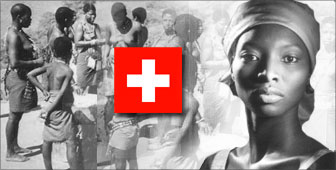New South Africa probe ruled out

Parliament has rejected calls to set up an independent inquiry into alleged apartheid-era links between the Swiss and South African secret services.
Some Swiss politicians and several non-governmental organisations had demanded an in-depth probe after fresh allegations of criminal activities between the two countries surfaced last year.
However, the House of Representatives rejected – by 94 votes to 60 – a proposal by the Social Democrat parliamentarian, Jean-Nils de Dardel, to set up an independent parliamentary commission.
De Dardel condemned the decision, claiming serious allegations were being ignored.
“Neither the cabinet nor Parliament are seriously interested in sending investigators to South Africa,” he said. “They’ve been closing the lid on this one for several months.”
At a court hearing in Pretoria last summer, Wouter Basson, the director of South Africa’s covert chemical weapons programme during the apartheid era, made detailed allegations of complicity between the two intelligence services.
Basson, who was on trial for murder, attempted murder and fraud, alleged that Peter Regli, the former head of Switzerland’s secret service, had helped him acquire 500kg of the illegal drug, Mandrax, from Russia in 1992.
Regli, who was cleared by a Swiss parliamentary inquiry three years ago of any involvement in South Africa’s covert weapons programme, denounced the allegations as “unsubstantiated slander”.
Regli denied allegations
In an interview with swissinfo last August, he insisted that the Swiss secret service “had nothing to do” with their South African counterparts.
However, the Swiss government announced in November that a parliamentary committee would re-open investigations into possible links between the two intelligence services.
Committee members were given the authority to question witnesses, examine documents in Switzerland and abroad, and be assisted by an independent expert – but critics said this did not go far enough.
The same month, the Swiss defence ministry launched its own internal inquiry into whether Switzerland was involved in helping South Africa to acquire chemical weapons.
Switzerland has been hit by a series of revelations in recent years alleging widespread collaboration between Swiss and South African institutions during the apartheid era.
Swiss were leading investors
A report, published in January this year by the independent Switzerland-South Africa Research Group, revealed that the Swiss were among the leading investors in South Africa at the time.
Gottfried Wellmer, author of the report, said major Swiss financial institutions had invested in Escom, the South African state electricity utility.
The group urged the Swiss government to establish a formal and independent body to investigate the country’s relations with apartheid South Africa.
Attention has also focused on the work of the shadowy Swiss-South African Association, which was backed by Swiss bankers and captains of industry.
Switzerland refused to apply international sanctions against South Africa between 1985 and the early 1990s, arguing that they did more harm than good to the oppressed population.
by Adam Beaumont

In compliance with the JTI standards
More: SWI swissinfo.ch certified by the Journalism Trust Initiative
You can find an overview of ongoing debates with our journalists here . Please join us!
If you want to start a conversation about a topic raised in this article or want to report factual errors, email us at english@swissinfo.ch.